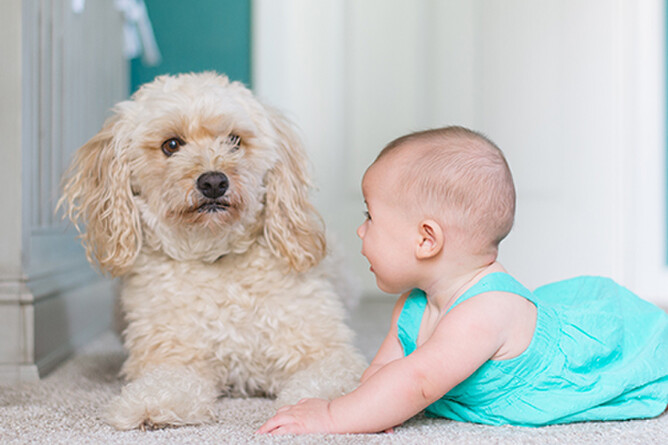Kids come with their own sets of rules, and unfortunately, most dogs don’t have the training manual! Many pooches naturally love kids, and vice versa, but sometimes it takes some training for things to go smoothly.
Because children are a fact of life, it’s essential to prepare your pooch to get along with (or at least tolerate) them.
It’s important to be proactive, both for the safety of little ones, and to keep your dog happy and relaxed.
So whether you’re expecting a baby or simply want to know you can take your pooch along to family barbecues without worrying, we’ve put together some advice for you.
If you’re expecting your first child, life is about to get very different! For your pooch, this can be an upsetting time, especially if they’ve been the ‘only child’ until now.
A new baby will inevitably disrupt the household routine, bring all sorts of new smells and noises, and of course take up a whole lot of your attention.
To ensure things go smoothly for both you and your pooch, and your baby is completely safe, there are ways you can prepare your dog for the new arrival.
1. Get basic obedience and behaviour sorted. Having these sorted will go a long way, as you’ll have a solid foundation of rules, and verbal obedience should you need to use it.
Solve any existing behavioral problems, and make sure your dog is socialised.
2. Gradually start introducing your dog to the sights, sounds and smells that might come along with the new baby, and accompany them with rewards.
You can start doing this around 4 months before the due date. That way, your pooch will come to love and look forward to the senses associated with the baby.
Quick tip! Try using baby lotions and shampoos on yourself, unwrapping baby supplies and furniture, and even play baby sound recordings.
3. Start incorporating the changes to your dog’s daily routine a couple of months before your due date.
For example, having afternoon naps or even practice getting up in the middle of night with your pooch and getting them settled and quiet.
If you usually feed your dog at a regular time every day, start changing this meal time within a wider window of time – life with a baby can be hectic and unpredictable, and you want to limit how abrupt this change is for them.
4. Slowly wean off the amount of attention you give your dog.
This may seem a little mean, but it’s inevitable that the new baby is going to take centre stage and you want this transition to be as gentle as possible – and to take the ‘blame’ off the new baby.
5. Start practising any new rules as soon as you know you’re expecting. When it comes to dogs and babies, you want to be strict.
This means no jumping up, barking or jumping on the furniture. To start with, it’s recommended that the baby’s room is off limits for your pooch without you, so start preparing them now.
6. For the big introduction:
- If possible, try and bring something that the baby has used home before you bring the baby home, to get your pooch used to the new scent
- Take your dog for a long walk before the introduction, to ensure they aren’t hyperactive
- Control the first meeting carefully, staying completely calm and letting your pooch sniff the new arrival from a distance first, gradually allowing them to come closer
- For any bad behaviour, try to avoid constant reprimanding and instead divert your pooch’s attention to a toy and reward them for playing with it.
For the kiddies
For dogs, toddlers and children are bewildering, if not downright scary, especially if your pooch isn’t used to them in their home environment.
Defensive dogs can be unpredictable, and this is why you’ve got to be extra vigilant when it comes to being around children.
Here are a few tips to help make your pooch’s kiddie interactions safe, fun and relaxing.
- Socialise your dog from a young age. Take them to friends’ houses with kids and playgrounds while they are still a puppy
- Don’t encourage over excitement, dominating games, or them putting their mouth on anyone (even gently)
- If kids come over to play with your pooch, explain to them to be gentle
- Practice taking your dog’s toys and food off them, to get them used to the unpredictable nature of little ones.
Dogs and babies or kids can share a very special relationship, even becoming the best of friends! For this to happen, you need to take responsibility to set clear boundaries and establish ground rules.
This way, little ones, parents and your pooch can be relaxed, safe and happy.
Here at Nose to Tail, we’ve got plenty of gear (and advice) to help child (or baby) proof your pooch. Give us a call on 09 448 2227 to order or pop in to Nose to Tail to pick up


